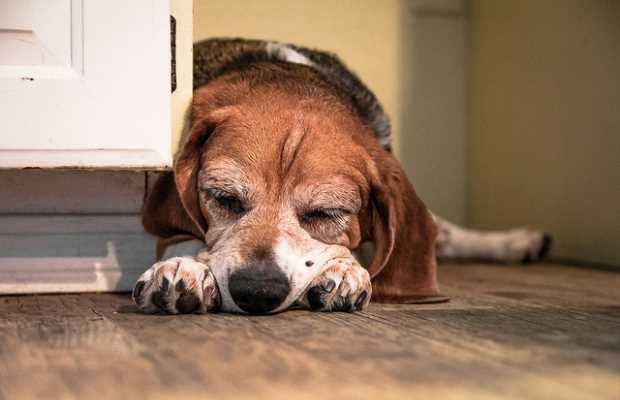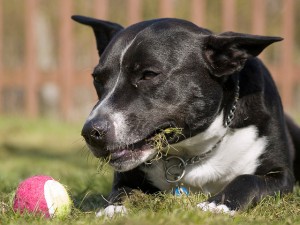
Poison prevention for dogs is always better than trying to find a cure, but sometimes things happen that are outside of our control.
One of the most terrifying moments that can happen to a dog owner is the realization that their beloved pet has ingested something toxic and deadly. Forewarned is forearmed though, and knowing the Do’s and Don’ts when it comes to poison prevention for dogs might just make the difference in saving your pet's life.
There are a few things that every single dog owner must know, and one of them is how to handle an emergency situation of when your dog is poisoned. Being aware of which foods, common household items and plants are deadly for your dog so that you can ensure his vitality and continued good health of your dog is just as important, however.
RELATED: Essential times for your dog's first aid kit

The biggest problem with poisoned dogs, or any other animals and pets for that matter (aside from the fact that they're poisoned), is that you can never tell when this happens until it's almost too late. Your dog won't complain, and usually you don't even see any signs of a poisoned dog until much later.
Unlike what you see in movies, it takes time for the poison to be digested in your canine's body and take effect. This is why a Dr. Tina Wismer from ASPCA's Animal Poison Control Center advises all pet owners to react quickly without hesitation:
“You need to act fast if you suspect your pet has eaten a poisonous substance, however, most toxins won’t activate immediately.”
Later in this article we will list some tips on what you should do as soon as you know your dog has been poisoned, but before we get into that, let's take a look at all the do's and don'ts of poison prevention for dogs and what pet owners can do to avoid some of the most critical situations.
Do's and Don'ts of Poison Prevention for Dogs
Dohave all the emergency contact information for your local vet and local Animal Poison Control Center easily available and up to date.No matter how good and experience pet owner you are, you can never predict your dog's actions with 100% certainty. Even if your dog hates chocolate, there will be that one day when she found a huge chunk and decided to subside her hunger with it. Be prepared.
Don'tgive your dog any pet medication that is not prescribed or has been advised by your vet for that specific emergency situation.Even if you have some substance left over or have used it before, always seek veterinary advice before administering any kind of medication to your pet. You have no idea what is happening inside your dog’s body, and some medicine could in effect make the situation that much worse.
Every poisoning and health emergency situation is different, and should be treated on a case by case basis. To be safe, always give a quick call to your vet when in doubt.
Domake sure your property is safe and clear of potential poisonous threats for your dog.Clean up your yard regularly from mushrooms and other weeds that your dog could eat; snakes, frogs and other creatures in the backyard can also pose threat to your pooch.
Make sure you don’t use any snail or slug bait, rat poison or insecticides on your property. Be aware if your neighbors do use or are using any of these toxins so that you know to keep your dog safely away from their yards.
Don'tgive your dog any human medications under any circumstances, even if it's for “treating poison symptoms.”This rule should be applied across the board and not only relevant for a dog that has been poisoned. Be sure that your human pills are safely out of reach from your dog at all times.
A dog's body will process pills of Ibuprofen, anti-depressants, diet pills and dietary supplements and vitamins much differently than a human body would. Any type of human medications and supplements can easily cause serious harm to your pet, and even be deadly.
Dokeep certain contents of your household locked away where your dog can’t possibly get to them.Dogs are naturally inquisitive and adventurous, and they really don’t discriminate when looking for something to chew on. Coffee grounds, cigarettes, batteries and dish washing tablets in particular can be tasty-looking but very dangerous to your dog if ingested.
Don'tlet your dog go through your or especially someone else's garbage or belongings.If you're concerned about poison prevention for dogs, then keep all waste materials away from your pet's investigative paws. Anything from nearly empty bottles of dish washing liquids to food that may have expired or grown moldy – all of this can be harmful to your dog.
You should also be aware if your pooch likes to go through someone else's garbage bins or trash cans. You never know what a stranger has thrown away and what your pooch can potentially consume.
Dohave a first aid kit for your dog that's easily accessible and has everything you'll need for dealing with a poisoned dog.We've listed the most essential items you need to have in your first aid kit for dogs. Some things you need to include are dog's forceps and tweezers, saline eye solution to wash out your dog’s eyes should he get splashed with something toxic, hydrogen peroxide (3%) to flush out his stomach if he’s eaten something that is poisonous, a turkey baster or syringe to administer the hydrogen peroxide, a muzzle, a blanket and your dog’s favorite canned food.
Don'tfeed your dog table scraps or human food unless you are 100% certain it is fine for him to have some.While many foods are perfectly safe for your dog, some can be poisonous and deadly. Chocolate, grapes and raisins, garlic and onions are a few of the many food items that we are accustomed to eating daily but which can be fatal if ingested by your dog.
Best practice is not completely stop the behavior of feeding your dog from the table. This is something that every dog owner finds very difficult to do but has to be done nonetheless.
When your dog has been poisoned

If poison prevention for dogs didn't work for you, and you know that your pooch has been poisoned or you suspect that she has ingested something toxic, the first thing to remember is: do not panic. Remain calm and level headed, otherwise you are more likely to cause more damage or miss something vital if you start panicking.
If you have witnessed your dog eating or drinking something she shouldn't have, collect any evidence such as bottles, papers, containers or bags and put them away safely. Call your poison control center or vet immediately and tell them what has happened.
RELATED: Most important tips on dog care
By collecting all the evidence and taking it with you to the emergency room, you'll provide your veterinarian with more information to draw an accurate assessment of your dog's poison case. Your vet will determine the best course of action to treat a poisoned dog if he can assess what toxins were ingested, when, how, from where and so forth. The more information you can provide, the better.
Remember that not all poisons or toxins show signs or symptoms in your dog straight away. Also, some dogs hide poisoning symptoms better than others, and you never know how long it will take for the poison to take effect. Hours or days can pass before you notice any changes in your dog, which is why poison prevention for dogs is extremely important.
To recap, here's a list of actions you must do if you suspect or know that your dog has ingested something toxic:
- Do not panic
- Collect all the evidence and write it down on a list so you don't forget
- Get Animal Poison Control on the phone, and ask for advice
- Prepare your first aid kit, and have all collected evidence with you
- Call up your vet and schedule an emergency appointment
ASPCA's Animal Poison Control emergency phone line: (888) 426-4435. A $65 consultation fee may be applied to your credit card.
Pet Poison Helpline's emergency phone line: (800) 213-6680
Symptoms of a poisoned dog
When it comes to symptoms of poisoning in dogs, these can vary widely based on the cause of poisoning and your dog. It's difficult to predict what symptoms relate to what poison cases, but veterinarians have suggested the following common sings of poisoning in dogs:
Gastrointestinal problems: vomiting, diarrhea, nausea, excessive drooling, loss of appetite.
Potential liver failure: vomiting, diarrhea, gums turning yellowish, jaundice, charcoal black stool, weakness (similar to low blood sugar symptoms), abnormal behavior.
Internal bleeding problem: vomiting blood, diarrhea with blood, coughs with blood, very rapid heart rate, lethargy and collapse, pale gums.
Potential kidney failure: vomiting, diarrhea, lack of appetite, halitosis, excessive urination, excessive thirst or lack of thirst and urination.
Common plants which are toxic to your dog

Unfortunately, our households can become minefields of poison for dogs. It's difficult to pinpoint and get rid of every item that doesn't comply with your poison prevention for dogs rule, but it's good to be aware of the most common causes of pet poisoning.
Some plants can be fatal to dogs.
Many of the common plants listed below can be found in our yards or your neighbor's yard, yet we have little or no idea how dangerous they are to our dogs. Dogs love eating grass, and it's not unusual for them to try different types of plant cuisine. Should you witness or suspect that your dog has ingested any of these plants, seek medical attention first.
RELATED: 10 Ways dog owners can become eco-friendly
When you call up your vet or Pet Poison Control helpline, they may instruct you to administer a stomach flush using 3% hydrogen peroxide at home to empty the contents of your dog’s stomach. Obviously, never administer any treatments or medication without consulting your vet first.

Here are some of the plants that are dangerous to your pooch:
- Rhubarb
- Apple
- Fig
- Lime
- Daffodil
- Calla lily
- Mistletoe
- Daisy
- Apricot
- Carnation
- Chamomile
- Macadamia nut
For many of these plants the poisonous components have not been identified; veterinarians simply know that these particular species can cause serious poisoning in pets (problems seen in dogs, cats and other domesticated animals with access to such plants).
RELATED: Best dog care tips from Cesar Millan
The best way to ensure poison prevention for dogs when it comes to plants is to treat them exactly like you would any other toxic substance – get them out of reach of your dog, and when outside, be aware of where these plants are and only let your pooch eat the most simple, plain grass. Nothing else should be consumed when outdoors.












